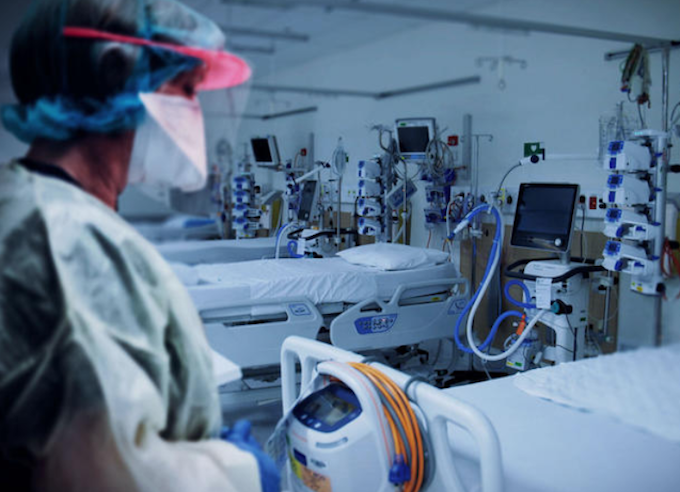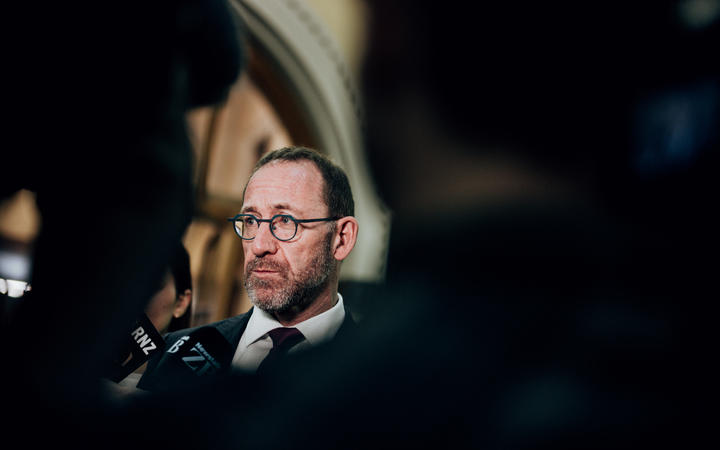
By Jane Patterson, RNZ political editor, and Rowan Quinn, health correspondent
As New Zealand readies for more covid-19 cases, warnings about the ability of public hospitals to cope are escalating.
There are 289 intensive care unit (ICU) or high dependency unit (HDU) beds at the moment, with Minister of Health Andrew Little insisting that could be ramped up to 550 if needed.
But that has been roundly questioned by opposition MPs, clinicians and ICU experts, including a recent New Zealand Medical Journal article concluding fully staffed, extra capacity would be more like 67 beds.
It describes New Zealand’s “comparatively low ICU capacity” as a “potential point of vulnerability” in the covid-19 response.
Intensive care
There is a reason it is called intensive care.
Patients there are so sick, each one has a nurse with them around the clock.
Those there because of covid-19 are usually struggling to breathe, their lungs unable to give their body all the oxygen it needs to function.
There are doctors, physios, pharmacists who come and go to give vital care but it is the nurses who are the constant.
That’s why the shortage of ICU nurses is at the heart of the debate.
New Zealand’s intensive care was already in a perilous position long before covid-19, with one of the lowest number of beds per capita in the developed world.
Doctors and nurses have been asking for help for 10 years, failing to make meaningful traction with successive governments.
The small community pulled together, pooled resources, when crises like the White Island eruption and the mass shooting in Christchurch hit.
But covid-19 is different. It is here for longer and will hit everywhere.
Political football
Little is “assured that we will manage and we will cope”.
High vaccination rates will mean fewer people will actually end up in hospital and “the vast majority who then get infected will be able to be cared for in the home with appropriate sort of monitoring, the stuff we’re putting in place at the moment”, he says.
He acknowledges any move to surge up would mean deferred operations for things like hip and knee replacements, and people needing a lower level of care getting it somewhere other than a hospital.
“The impact will be on non-covid patients who can be safely referred to other places for their care and recovery at the hospital.”

National Party MP Shane Reti says there are simply not enough specialist ICU nurses.
“Five point three nurses [needed per ICU] bed, it’s orphaned out and what we know from specialists … is that instead of the hundreds of beds that Andrew says we’ve got we’ve probably only got about 67 to surge to.”
Not wanting to sound like a “political caricature”, Little, however, lays the blame at the feet of the previous National government.
Heath underfunded
“Our ICU capacity – if we’re talking about just designated ICU wards, and ICU beds, yep, that’s been a long standing problem … the reality is health has been underfunded for a long time, particularly when it comes to health facilities and buildings,” he says.
He is confident any outbreak can be managed, saying expanding to 500 or so beds would require an increase to about 200,000 covid-19 patients across the country.
However, Reti says that the May 5 public sector pay freeze has impacted on staffing, with some going to Australia, and that New Zealand’s now competing with the world for ICU nurses with an immigration system that’s not friendly to them.

Nursing shortage
Even with the known nursing vacancies, New Zealand’s needs could be met with the training of about 1400 more nurses to work in ICU under supervision, Little says.
Through May 2020 till mid August this year, there were no new, resourced ICU beds in Auckland DHB, but the ICU nurse headcount dropped from about 250 to just over 212.
Reti says the nursing shortage is a major obstacle.
“When Minister Little says, ‘I’ve trained up 1400 ICU nurses’ — no you haven’t, what you’ve done is you’ve given them half a day’s online training and half a day on a mannequin.
“In no shape or form is that an ICU nurse — they’ll be valuable, don’t get me wrong — but valuable for turning patients in ICU?”
Auckland has the biggest ICU unit in the country, and needed to find nurses from across New Zealand on September 1 when eight active cases arrived there, he says, showing just how thin the margins are.
On the ground
Vice-president of the Australasian College of Intensive Care Rob Bevan says right now intensive care is coping well.
That is due, in large part, to high — and rising — vaccination rates and the fact that Auckland’s been in lockdown.
Quieter lives mean fewer car accident and workplace falls, while hospitals have delayed many of the planned operations which might involve ICU recovery.
But Dr Bevan, a specialist at Auckland’s Middlemore Hospital, says more beds will be needed next year when covid-19 is in the community and life was comparatively back to normal.
“There is going to be a burden of covid that people will need hospitalisation and intensive care for that we need to add onto what we were doing before,” he says.
“And acknowledging that our intensive care bed capacity before was still not enough to care for everybody without resorting to the deferment of planned care on occasion.”
Many who work in intensive care say the government and health bosses are wrong to count physical beds (and the equipment that comes with them) when there are not enough nurses to use them all.
Shocked by ‘training’
When they said they were training other nurses to help in ICU, the nurses organisation kaiwhakahaere Kerri Nuku said she was shocked to learn what that meant.
“Four hours online training — to go and support in ICU. Those decisions about what’s in the best interests of nursing have not been made for nurses,” she said.
Indeed, specialist ICU nurses say they would have to spend time supervising the online trained back-ups, adding more work to an already very challenging job.
And Bevan says surging up to more than 500 beds is not a realistic picture.
“That is a crisis, short term, and largely unsustainable model that we would have had to have moved to had we been overwhelmed like they have been in other parts of the world,” he says.
“But that would most likely achieve worse outcomes for all patients in ICU than they have in other parts of the world compared with our best model of care that we’ve been able to provide to date.”
The message is starting to get through to those who made decisions, he says.
Intensive care meetings
Intensive care bodies are meeting with the Ministry of Health twice a week and there is work underway to try to recruit more nurses from overseas, he says.
But it has to go beyond talk and into action, first to sort the short term problem but then to keep building on that over the next several years.
“The next pandemic is inevitable … it might be in 10 years, it might be in 100 years, but it is coming,” Bevan says.
Little says he has also asked for decisions on three DHBs proposals expanding ICU capacity to be “accelerated”, but even then, those “will be some months away — they won’t be instant”.
This article is republished under a community partnership agreement with RNZ.





































